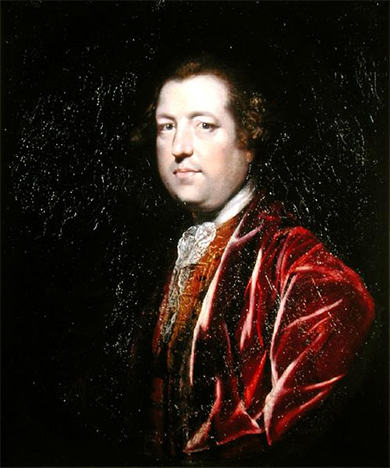| << Chapter < Page | Chapter >> Page > |
Colonists’ joy over the repeal of the Stamp Act and what they saw as their defense of liberty did not last long. The Declaratory Act of 1766 had articulated Great Britain’s supreme authority over the colonies, and Parliament soon began exercising that authority. In 1767, with the passage of the Townshend Acts, a tax on consumer goods in British North America, colonists believed their liberty as loyal British subjects had come under assault for a second time.
Lord Rockingham’s tenure as prime minister was not long (1765–1766). Rich landowners feared that if he were not taxing the colonies, Parliament would raise their taxes instead, sacrificing them to the interests of merchants and colonists. George III duly dismissed Rockingham. William Pitt, also sympathetic to the colonists, succeeded him. However, Pitt was old and ill with gout. His chancellor of the exchequer, Charles Townshend ( [link] ), whose job was to manage the Empire’s finances, took on many of his duties. Primary among these was raising the needed revenue from the colonies.

Townshend’s first act was to deal with the unruly New York Assembly, which had voted not to pay for supplies for the garrison of British soldiers that the Quartering Act required. In response, Townshend proposed the Restraining Act of 1767, which disbanded the New York Assembly until it agreed to pay for the garrison’s supplies, which it eventually agreed to do.
The Townshend Revenue Act of 1767 placed duties on various consumer items like paper, paint, lead, tea, and glass. These British goods had to be imported, since the colonies did not have the manufacturing base to produce them. Townshend hoped the new duties would not anger the colonists because they were external taxes, not internal ones like the Stamp Act. In 1766, in arguing before Parliament for the repeal of the Stamp Act, Benjamin Franklin had stated, “I never heard any objection to the right of laying duties to regulate commerce; but a right to lay internal taxes was never supposed to be in parliament, as we are not represented there.”
The Indemnity Act of 1767 exempted tea produced by the British East India Company from taxation when it was imported into Great Britain. When the tea was re-exported to the colonies, however, the colonists had to pay taxes on it because of the Revenue Act. Some critics of Parliament on both sides of the Atlantic saw this tax policy as an example of corrupt politicians giving preferable treatment to specific corporate interests, creating a monopoly. The sense that corruption had become entrenched in Parliament only increased colonists’ alarm.

Notification Switch
Would you like to follow the 'U.s. history' conversation and receive update notifications?